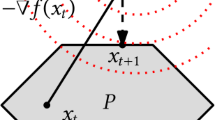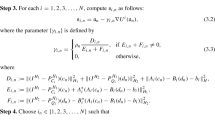Abstract
Iterative linear solvers have gained recent popularity due to their computational efficiency and low memory footprint for large-scale linear systems. The relaxation method, or Motzkin’s method, can be viewed as an iterative method that projects the current estimation onto the solution hyperplane corresponding to the most violated constraint. Although this leads to an optimal selection strategy for consistent systems, for inconsistent least square problems, the strategy presents a tradeoff between convergence rate and solution accuracy. We provide a theoretical analysis that shows Motzkin’s method offers an initially accelerated convergence rate and this acceleration depends on the dynamic range of the residual. We quantify this acceleration for Gaussian systems as a concrete example. Lastly, we include experimental evidence on real and synthetic systems that support the analysis.








Similar content being viewed by others
Notes
We use the convention that an empty sum or product equates to one.
This can be readily verified by observing that the distribution of \(\mathbf {a}_i\) is rotationally invariant and thus \(\left( \mathbf {a}_i^T\frac{\mathbf {x}}{\Vert \mathbf {x}\Vert }\right) ^2\) has the same distribution as \(\left( \mathbf {a}_i^T\mathbf {e}_1\right) ^2\), where \(\mathbf {e}_1\) is the first coordinate vector. Thus it has the same distribution as the ratio of chi-square random variables \(g_1^2/\sum _{i=1}^n g_i^2\), for i.i.d. standard normal \(g_i\). One then applies Slutsky’s theorem to obtain the asymptotic result.
References
Agmon, S.: The relaxation method for linear inequalities. Can. J. Math. 6, 382–392 (1954)
Censor, Y.: Row-action methods for huge and sparse systems and their applications. SIAM Rev. 23(4), 444–466 (1981). https://doi.org/10.1137/1023097
Chen, X., Powell, A.: Almost sure convergence of the Kaczmarz algorithm with random measurements. J. Fourier Anal. Appl. (2012). https://doi.org/10.1007/s00041-012-9237-2
De Loera, J.A., Haddock, J., Needell, D.: A sampling Kaczmarz–Motzkin algorithm for linear feasibility. SIAM J. Sci. Comput. 39(5), S66–S87 (2017)
Eldar, Y.C., Needell, D.: Acceleration of randomized Kaczmarz method via the Johnson–Lindenstrauss lemma. Numer. Algorithms 58(2), 163–177 (2011). https://doi.org/10.1007/s11075-011-9451-z. 65F20 (65F10); 2835851; Alexander N. Malyshev
Gower, R.M., Richtárik, P.: Randomized iterative methods for linear systems. SIAM J. Matrix Anal. Appl. 36(4), 1660–1690 (2015)
Kaczmarz, S.: Angenäherte auflösung von systemen linearer gleichungen. Bull. Int. Acad. Polon. Sci. Lett. Ser. A, 335–357 (1937)
Leventhal, D., Lewis, A.S.: Randomized methods for linear constraints: convergence rates and conditioning. Math. Oper. Res. 35(3), 641–654 (2010). https://doi.org/10.1287/moor.1100.0456
Ma, A., Needell, D., Ramdas, A.: Convergence properties of the randomized extended Gauss–Seidel and Kaczmarz methods. SIAM J. Matrix Anal. Appl. 36(4), 1590–1604 (2015)
Motzkin, T.S., Schoenberg, I.J.: The relaxation method for linear inequalities. Can. J. Math. 6, 393–404 (1954)
Needell, D.: Randomized Kaczmarz solver for noisy linear systems. BIT Numer. Math. 50(2), 395–403 (2010)
Netlib: The Netlib Linear Programming Library. www.netlib.org/lp. Accessed 7 Nov 2017
Nutini, J., Sepehry, B., Virani, A., Laradji, I., Schmidt, M., Koepke, H.: Convergence rates for greedy Kaczmarz algorithms. Conference on Uncertainty in Artificial Intelligence (2016)
Petra, S., Popa, C.: Single projection Kaczmarz extended algorithms. Numer. Algorithms. (2015). https://doi.org/10.1007/s11075-016-0118-7
Richtárik, P., Takáč, M.: Iteration complexity of randomized block-coordinate descent methods for minimizing a composite function. Math. Program. 144, 1–38 (2012)
Rosenblatt, F.: The perceptron: a probabilistic model for information storage and organization in the brain. Cornell Aeronaut. Lab. Psychol. Rev. 65(6), 386–408 (1958)
Strohmer, T., Vershynin, R.: A randomized Kaczmarz algorithm with exponential convergence. J. Fourier Anal. Appl. 15(2), 262–278 (2009)
Vershynin, R.: In: In: Compressed Sensing, (ed.) Introduction to the non-asymptotic analysis of random matrices, pp. 210–268. University Press, Cambridge (2012)
Zouzias, A., Freris, N.M.: Randomized extended Kaczmarz for solving least squares. SIAM J. Matrix Anal. Appl. 34(2), 773–793 (2013)
Author information
Authors and Affiliations
Corresponding author
Additional information
Communicated by Lars Eldén.
This material is based upon work supported by the National Science Foundation under Grant No. DMS-1440140 while the authors were in residence at the Mathematical Sciences Research Institute in Berkeley, California, during the Fall 2017 semester. Jamie Haddock was also partially supported by NSF Grant DMS-1522158 and the University of California, Davis Dissertation Fellowship. Deanna Needell was also supported by NSF CAREER award \(\#1348721\) and NSF BIGDATA \(\#1740325\).
Rights and permissions
About this article
Cite this article
Haddock, J., Needell, D. On Motzkin’s method for inconsistent linear systems. Bit Numer Math 59, 387–401 (2019). https://doi.org/10.1007/s10543-018-0737-6
Received:
Accepted:
Published:
Issue Date:
DOI: https://doi.org/10.1007/s10543-018-0737-6




